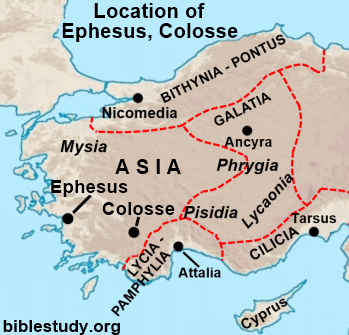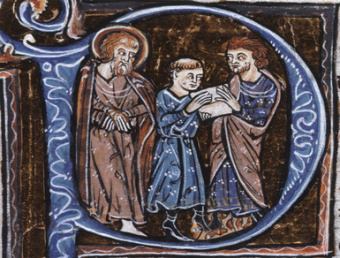Philemon 1
1. Why was the Apostle Paul a prisoner when he wrote Philemon (verses 1, 9)? Answer
2. How could Paul write and send a letter if he was a prisoner? Answer
3. Who was Philemon, Apphia and Archippus (verse 2)? Answer
4. Who started the church in Colosse (verse 2)? Answer
5. What is Paul trying to accomplish in verses 5 to 7? Answer
6. What is the point Paul is trying to make in verses 8 and 9? Answer
7. The apostle calls himself "Paul the aged" (verse 9). How old was he at the time he wrote Philemon? Answer
8. Who was Onesimus (verse 10)? Answer
9. What is Paul's point in verse 11? Answer
10. What does Paul decide to do with Onesimus? Answer
11. What does Paul want Philemon to do after his former slave comes back to him? Answer
12. How does Paul try to further soften Philemon's concerns about freeing his slave? Answer
13. What is promised to help cover losses caused by Onesimus? Answer
14. What is the reward promised to Philemon for his willingness to carry out what Paul is suggesting in the letter? Answer
15. Did Paul ever fulfill his promise to visit Colosse and Philemon in particular (verse 22)? Answer
16. Who delivered Paul's letter to Philemon? Answer
Philemon 1 Answers
1. The Apostle Paul, at the time he wrote Philemon, was a prisoner in Rome. He was arrested by the Romans at Jerusalem's temple for causing (according to the Jews) a riot in 58 A.D. (Acts 22). After spending two years in a Caesarea jail he was finally escorted to Rome, arriving in the capital in the early spring of 61 A.D. (Acts 28:16).
2. Paul's first imprisonment by Rome ran from early spring of 61 to early spring of 63 A.D. During this period He was allowed special privileges like staying in a hired home under guard as opposed to being taken to a common prison. He was additionally allowed to write and send letters (e.g. to Philemon) as well as to have visitors. All this enabled him to preach the gospel while in chains (see Acts 28).
The liberties allowed Paul, though a Roman prisoner, made it possible for Onesimus to find and meet him.
[How Long Was Paul in Prison?]
3. Philemon was a fairly well off Christian living in Colosse who owned a slave named Onesimus (Philemon 1:10, 16). After He became a Christian through the Apostle Paul (verse 19) he opened up his home to host church services every Sabbath.

Apphia was highly likely the name of Philemon's wife while Archippus was possibly their son.
4. The church in Colosse was likely started by Epaphras (Philemon 1:23) or possibly Timothy (verse 1). In Colossians Paul calls Epaphras a faithful minister in the local church.
As ye also learned of Epaphras our dear fellowservant, who is for you a faithful minister of Christ (Colossians 1:7).
5. Paul, in verses 5 to 7, offers his sincere appreciation of Philemon's efforts to encourage and aid the brethren. These verses, however, also serve to "soften up" Philemon for the bold request he will be asked!
[Most Encouraging Bible Verses!]
6. Paul states that what he is about to ask of Philemon he could, as an apostle with spiritual authority, command his friend to do. He lets him know, however, that he has decided not to do this but instead to encourage him to do what is right (Philemon 1:8 - 9).
7. The Apostle Paul was likely born around 2 A.D. in Tarsus. He wrote Philemon between 61 and 63 A.D. which would make him between 59 and 61 years old when he wrote his letter.
[Paul's Birth to First Journey Timeline]
8. Onesimus, one of possibly several slaves Philemon owned, ran away from his master in Colosse. Verse 18 could imply that Onesimus either ran away after stealing something such as money or stole something after he decided to escape.
Onesimus, sometime after leaving Philemon, found Paul in Rome. It is unclear whether Onesimus fled with the intention of reaching Paul or planned something else and then decided to seek him. What is clear is that after the two men met Onesimus became a Christian (verse 10). Paul considered him his spiritual son in the faith.
9. Paul's point in verses 11 is that although Onesimus is not now useful to Philemon (since he ran away) he has, upon becoming a Christian, become useful to both of them.
10. Paul acknowledges he would greatly appreciate Onesimus' continued help (Philemon 1:13). He decides, however, to send him back to his master out of respect of Philemon's right to decide the ultimate fate of his slave (verses 11, 13 - 14).
[Map of All Cities Paul Visited]
11. Paul is careful not to express precisely what he wants Philemon to do with Onesimus when he arrives back in Colosse. He does, however, strongly hint as to the decision he hopes his friend will make.
No longer as a slave, but above a slave - as a beloved brother, especially to me, and how much more to you, both in the flesh and in the Lord?
If therefore you count me as a partner, receive him as if he were me (Philemon 1:16 - 17, HBFV).
Paul is ultimately asking Philemon to treat Onesimus no longer as a slave but rather as a beloved spiritual brother with the same freedom "in the flesh" he enjoys.
The apostle's hope is that his friend will make the tough decision of giving Onesimus his freedom. Such a decision involves a large financial loss, as slaves in the first century A.D. cost nine times the wages a laborer made in a year (Holman Concise Bible Commentary).
12. Paul tries to further soften Philemon's response to seeing Onesimus again by suggesting God's possible involvement!

For perhaps on account of this (God's conversion of Onesimus through Paul) he was separated from you for a time in order that you might receive him for eternity (Philemon 1:15, HBFV).
Paul, in a subtle fashion, injects God's possible (though not certain!) involvement in Onesimus becoming a runaway slave. If true this would mean that any decision by Philemon either to punish or refuse freeing him (or both) could be against God's will!
13. The apostle promises to cover any losses caused by Onesimus (verses 18 - 19). This act is known as surety in the Bible.
Paul seals his agreement to pay for losses by stating he wrote the entire letter with his own hand. This is something he rarely did due to his poor writing skills (see Romans 16:22, 1Corinthians 16:21, Galatians 6:11, Colossians 4:18, 2Thessalonians 3:17).
14. Paul's reward for Philemon's obedience is to promise to visit him as soon as he is freed from prison (verses 22). This act would, of course, also verify whether or not his friend did what was suggested he do.
[Paul's Last Missionary Journey Map]
15. The book of Colossians, written during Paul's imprisonment just like Philemon (61 to 63 A.D.), mentions that the apostle up to that time had yet to visit Colosse.
For I would that ye knew what great conflict I have for you, and for them at Laodicea, and for as many as have not seen my face in the flesh (Colossians 2:1).
After Paul was released from prison in 63 A.D. he traveled to Crete, Nicopolis and then possibly to Spain and Britain for evangelistic purposes (Romans 15:22 - 24, 28). He was then arrested and taken to Rome where he was put to death. The Bible does not record Paul ever visited Colosse as was promised in Philemon 1:22.
16. In the subscription of verse 25 in the King James and other translations it states that Paul tasked Onesimus to deliver his letter.
. . . Written from Rome to Philemon, by Onesimus a servant (Philemon 1:25).
A man named Tychicus, mentioned in Colossians 4, likely accompanied Onesimus on his trip to Colosse. Tychicus was possibly charged by Paul to deliver his letter to the Colossians while Onesimus carried the apostle's personal letter to Philemon.
Tychicus, a beloved brother, and a faithful minister and fellow servant in the Lord, will make known to you everything concerning me . . .
Together with Onesimus, a faithful and beloved brother, who is one of you. They will make known to you all the things that have taken place here (Colossians 4:7, 9, HBFV).